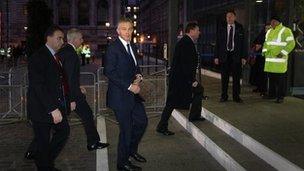Commons to debate Iraq war inquiry
- Published
- comments
It looks as if the Commons will have its debate on the Iraq war inquiry on 29 January.
Uber-awkward squaddie David Davis had a very warm reception from the Commons Backbench Business Committee, today, when he appeared before them to urge them to grant a debate on a motion calling for Sir John Chilcot to publish his long-awaited report well before the General Election in May.
The Chilcot Inquiry, external finished taking evidence five years ago and has been digesting the vast mass of information and evidence it received, ever since. But MPs are increasingly impatient to see his verdict, and Mr Davis - with 16 supporters across most parties in the Commons - is proposing a motion which would call for its rapid publication (the exact time limit it sets will depend on the final timing of any debate).

Tony Blair gave evidence to the Iraq Inquiry on 21 January 2010
He argues it is a democratic necessity that the report is available to the voters well before the General Election - and government ministers have already said it would be wrong to release the report in mid-campaign.
Mr Davis wants a full-dress six-hour debate in the Commons Chamber, on a voteable motion, which would allow the House to register its opinion. And he quoted the Iraq-era foreign secretary Jack Straw as saying that he would be keen to speak in such a debate.
But the Commons' verdict would only be an opinion. The chair of the Backbench Business Committee, Natascha Engel, told the committee that she had been advised by the Commons Clerks that no motion could be made binding on the workings of an independent inquiry. But Mr Davis hopes that the effect of passing such a motion would be either to jolt the inquiry into publishing as soon as possible, or, alternatively, into explaining why it is taking so long to produce its report.
He insists there is no party political agenda here, noting that he voted for the Iraq War in 2003 - along with David Cameron. Ed Miliband and Nick Clegg were not even MPs at the time. But he fears that the lengthy delay is discrediting the whole concept on public inquiries, as well as angering the families of the service personnel killed or injured in Iraq.